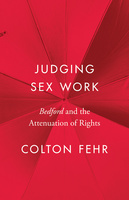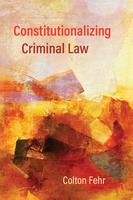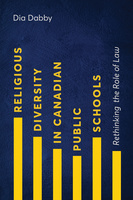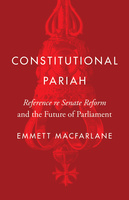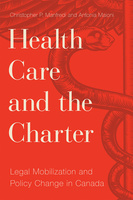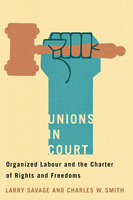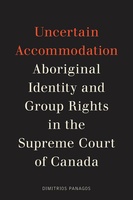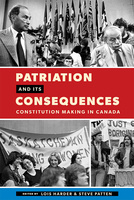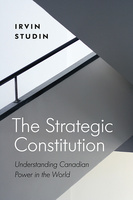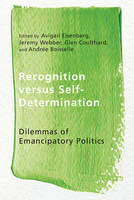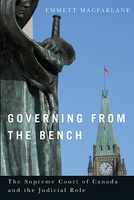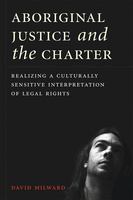Canada’s Surprising Constitution
Unexpected Interpretations of the Constitution Act, 1982
Canada’s Surprising Constitution asks why the Constitution Act, 1982, keeps generating unexpected interpretations and outcomes.
Judging Sex Work
Bedford and the Attenuation of Rights
Judging Sex Work argues that a decision widely considered to be a victory for social justice weakened sex workers’ rights far more than it strengthened them.
Constitutionalizing Criminal Law
Constitutionalizing Criminal Law explains why the Supreme Court of Canada’s jurisprudence considering the constitutionality of criminal laws fails to strike a principled balance between the need to increase the coherency of the criminal law while maintaining the legitimacy of judicial review.
Religious Diversity in Canadian Public Schools
Rethinking the Role of Law
This comprehensive analysis of the legally complex relationship between religion and public schools will compel readers to reconsider the role of law in education.
Constitutional Pariah
Reference re Senate Reform and the Future of Parliament
Constitutional Pariah is the first comprehensive account of the Senate in the aftermath of the landmark Supreme Court decision that resulted in one of the most significant reforms to Parliament in Canadian history.
Privacy in Peril
Hunter v Southam and the Drift from Reasonable Search Protections
This book, the second in the Landmark Cases in Canadian Law series, argues that in subsequent, post-Hunter v Southam decisions, the Supreme Court of Canada has strayed from the principles set out in that case, which were intended to protect the privacy of citizens from encroaching state power.
Health Care and the Charter
Legal Mobilization and Policy Change in Canada
An engaging study of the clash between two iconic Canadian policy instruments – universal, single-payer health care and the Canadian Charter of Rights and Freedoms – and the effects on politics and policy.
Unions in Court
Organized Labour and the Charter of Rights and Freedoms
This book demonstrates how and why labour’s long-standing distrust of the legal system has given way to a Charter-based legal strategy designed to protect workers’ rights and freedoms.
Uncertain Accommodation
Aboriginal Identity and Group Rights in the Supreme Court of Canada
A bold analysis of what happened when Canada attempted to extend group rights to Aboriginal people in the early 1980s and why it went wrong.
Patriation and Its Consequences
Constitution Making in Canada
Patriation and Its Consequences examines the political events and struggles that resulted in the 1981 agreement to patriate the Canadian constitution and sheds light on the political consequences of this key moment in Canadian history.
The Strategic Constitution
Understanding Canadian Power in the World
Bridging the solitudes of constitutional law and international relations, this book offers a brand new interpretation of Canada’s Constitution.
Recognition versus Self-Determination
Dilemmas of Emancipatory Politics
This book re-evaluates the role of recognition in analyzing relations between groups in plural societies, the position of indigenous peoples in settler societies, and the principle of the self-determination of peoples.
Governing from the Bench
The Supreme Court of Canada and the Judicial Role
Governing from the Bench is a comprehensive and illuminating examination of the Supreme Court of Canada that draws on in-depth interviews to reveal the inner workings of this often-misunderstood institution at the heart of Canada’s justice system.
Aboriginal Justice and the Charter
Realizing a Culturally Sensitive Interpretation of Legal Rights
This book explores the tension between Aboriginal justice methods and the Canadian Charter of Rights and Freedoms, while searching for practical ways to implement Aboriginal justice.
The Right to a Healthy Environment
Revitalizing Canada's Constitution
Renowned environmental lawyer David R. Boyd argues that Canada must constitutionalize environmental rights and responsibilities if it hopes to improve its environmental record.


